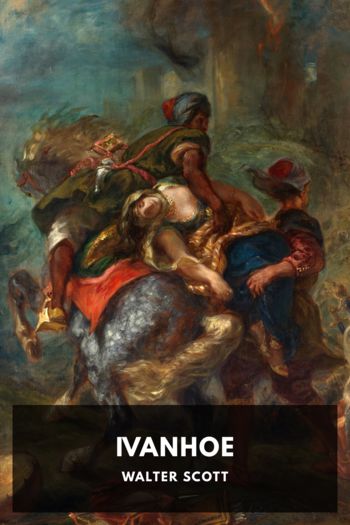Ivanhoe - Walter Scott (bookreader txt) 📗

- Author: Walter Scott
Book online «Ivanhoe - Walter Scott (bookreader txt) 📗». Author Walter Scott
—Flower of warriors,
How is’t with Titus Lartius?
As with a man busied about decrees,
Condemning some to death and some to exile,
Ransoming him or pitying, threatening the other.
The captive Abbot’s features and manners exhibited a whimsical mixture of offended pride, and deranged foppery and bodily terror.
“Why, how now, my masters?” said he, with a voice in which all three emotions were blended. “What order is this among ye? Be ye Turks or Christians, that handle a churchman?—Know ye what it is, manus imponere in servos Domini? Ye have plundered my mails—torn my cope of curious cut lace, which might have served a cardinal!—Another in my place would have been at his excommunicabo vos; but I am placible, and if ye order forth my palfreys, release my brethren, and restore my mails, tell down with all speed an hundred crowns to be expended in masses at the high altar of Jorvaulx Abbey, and make your vow to eat no venison until next Pentecost, it may be you shall hear little more of this mad frolic.”
“Holy Father,” said the chief Outlaw, “it grieves me to think that you have met with such usage from any of my followers, as calls for your fatherly reprehension.”
“Usage!” echoed the priest, encouraged by the mild tone of the silvan leader; “it were usage fit for no hound of good race—much less for a Christian—far less for a priest—and least of all for the Prior of the holy community of Jorvaulx. Here is a profane and drunken minstrel, called Allan-a-Dale—nebulo quidam—who has menaced me with corporal punishment—nay, with death itself, an I pay not down four hundred crowns of ransom, to the boot of all the treasure he hath already robbed me of—gold chains and gymmal rings to an unknown value; besides what is broken and spoiled among their rude hands, such as my pouncer-box and silver crisping-tongs.”
“It is impossible that Allan-a-Dale can have thus treated a man of your reverend bearing,” replied the Captain.
“It is true as the gospel of Saint Nicodemus,” said the Prior; “he swore, with many a cruel north-country oath, that he would hang me up on the highest tree in the greenwood.”
“Did he so in very deed? Nay, then, reverend father, I think you had better comply with his demands—for Allan-a-Dale is the very man to abide by his word when he has so pledged it.”43
“You do but jest with me,” said the astounded Prior, with a forced laugh; “and I love a good jest with all my heart. But, ha! ha! ha! when the mirth has lasted the livelong night, it is time to be grave in the morning.”
“And I am as grave as a father confessor,” replied the Outlaw; “you must pay a round ransom, Sir Prior, or your convent is likely to be called to a new election; for your place will know you no more.”
“Are ye Christians,” said the Prior, “and hold this language to a churchman?”
“Christians! ay, marry are we, and have divinity among us to boot,” answered the Outlaw. “Let our buxom chaplain stand forth, and expound to this reverend father the texts which concern this matter.”
The Friar, half-drunk, half-sober, had huddled a friar’s frock over his green cassock, and now summoning together whatever scraps of learning he had acquired by rote in former days, “Holy father,” said he, “Deus faciat salvam benignitatem vestram—You are welcome to the greenwood.”
“What profane mummery is this?” said the Prior. “Friend, if thou be’st indeed of the church, it were a better deed to show me how I may escape from these men’s hands, than to stand ducking and grinning here like a morris-dancer.”
“Truly, reverend father,” said the Friar, “I know but one mode in which thou mayst escape. This is Saint Andrew’s day with us, we are taking our tithes.”
“But not of the church, then, I trust, my good brother?” said the Prior.
“Of church and lay,” said the Friar; “and therefore, Sir Prior facite vobis amicos de Mammone iniquitatis—make yourselves friends of the Mammon of unrighteousness, for no other friendship is like to serve your turn.”
“I love a jolly woodsman at heart,” said the Prior, softening his tone; “come, ye must not deal too hard with me—I can well of woodcraft, and can wind a horn clear and lustily, and hollow till every oak rings again—Come, ye must not deal too hard with me.”
“Give him a horn,” said the Outlaw; “we will prove the skill he boasts of.”
The Prior Aymer winded a blast accordingly. The Captain shook his head.
“Sir Prior,” he said, “thou blowest a merry note, but it may not ransom thee—we cannot afford, as the legend on a good knight’s shield hath it, to set thee free for a blast. Moreover, I have found thee—thou art one of those, who, with new French graces and Tra-li-ras, disturb the ancient English bugle notes.—Prior, that last flourish on the recheat hath added fifty crowns to thy ransom, for corrupting the true old manly blasts of venerie.”
“Well, friend,” said the Abbot, peevishly, “thou art ill to please with thy woodcraft. I pray thee be more conformable in this matter of my ransom. At a word—since I must needs, for once, hold a candle to the devil—what ransom am I to pay for walking on Watling-street, without having fifty men at my back?”
“Were it not well,” said the Lieutenant of the gang apart to the





Comments (0)